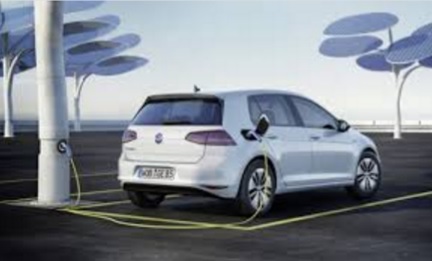VW settlement funds: Volkswagen Group’s $30.4 billion “Dieselgate” U.S. settlement is taking shape, including nearly $3 billion going out to states through the Environmental Mitigation Trust. California leads  the list, so far securing $422.6 million going toward zero-emission heavy-duty trucks, buses, and charging stations. Texas was second, at $209.3 million, Florida third at $166.3 million, New York fourth at $127.7 million, and Pennsylvania in fifth place at $118.6 million. The next five on the list were Washington state at $112.7 million, Illinois at $108.7 million, Virginia at $93.6 million, North Carolina at $92 million, and Maryland at $75.7 million. School buses are a priority for several states that have received funds. More than 10 states have finalized their plans, according to the Sierra Club. State officials are deciding how the money will be spent meeting guidelines under the settlement. The funding must go towards reducing nitrogen oxides (NoX), a major component of air pollution. Only 15% can go toward the electric vehicle charging infrastructure. The settlement funds are being divvied up based on how many Volkswagen diesel cars with emission-cheating software were registered within each state.
the list, so far securing $422.6 million going toward zero-emission heavy-duty trucks, buses, and charging stations. Texas was second, at $209.3 million, Florida third at $166.3 million, New York fourth at $127.7 million, and Pennsylvania in fifth place at $118.6 million. The next five on the list were Washington state at $112.7 million, Illinois at $108.7 million, Virginia at $93.6 million, North Carolina at $92 million, and Maryland at $75.7 million. School buses are a priority for several states that have received funds. More than 10 states have finalized their plans, according to the Sierra Club. State officials are deciding how the money will be spent meeting guidelines under the settlement. The funding must go towards reducing nitrogen oxides (NoX), a major component of air pollution. Only 15% can go toward the electric vehicle charging infrastructure. The settlement funds are being divvied up based on how many Volkswagen diesel cars with emission-cheating software were registered within each state.
Looking at the Big Picture: Green Auto Market’s take on developments impacting the auto industry, global economy, and clean transportation.
Implications of trade war on auto industry: President Trump has placed tariffs on $34 billion of Chinese imports, including auto parts. China, in retaliation, hiked tariffs on U.S. light-duty vehicles imports to 40% from 15%. The trade war has been building for months now, with automakers working hard to ship more vehicles to the U.S. to pre-empt the higher tariffs being slapped on. The ports of Baltimore, Jacksonville, Fla.; and Brunswick, Ga. — the three leading U.S. ports for importing automobiles — in May shipped out a combined 23,000 more cars than they did a year earlier. The port of Long Beach, Calif., saw imports rise 3.4% in May and exports drop 24%. Auto executives and analysts have been reminding the Trump administration that vehicles built in the U.S. are packed with foreign import parts. The cost will be extreme — tariffs that will be placed in imported parts could cost $35 billion along with a whopping $48 billion on tariffs for imported cars assembled outside the U.S., according to the American Automotive Policy Council, a lobbying group that represents the three Detroit automakers. The trade war between the U.S. and China will also have implications for electric vehicle sales, with Tesla particularly vulnerable through building its EVs in the U.S. and exporting to China.
Big oil vs. utilities: Oil companies and utilities are wondering which of the two economic sectors will dominate the booming electric vehicle charging infrastructure around the world. BP and Shell have charging company acquisitions in the works, with Europe being a key market for EV infrastructure growth. Utilities are preparing to meet the surging demand for electric power for high-volume EV sales in the next decade and beyond. BP will be investing about $170 million to acquire EV charging company, Chargemaster. The major oil company plans to add charging stations to its network of retail fueling stations. Sweden’s Vattenfall and Finland’s Fortum Oyj utilities are currently installing chargers at homes and at workplaces; and the U.S. is seeing utilities playing a major role in building the charging infrastructure.
BYD working with Changan: BYD has forged a strategic cooperation agreement with Changan Automobile to jointly manufacture batteries for electric vehicles. A new joint venture company has been set up in the city Chongqing in central China. Both companies plan for the total battery production capacity of 10 GWh to be staggered over two phases, with the first stage estimated to amount to 5-6GWh and the second stage 4-5GWh. “This strategic agreement marks a significant milestone in the way BYD conducts its supply and marketing. Today’s announcement has implications for the company’s battery business and the long term development of the entire organization,” said BYD President and Chairman Wang Chuanfu.
Pruitt leaving administration: Controversial EPA Administrator Scott Pruitt is stepping down, President Trump announced yesterday afternoon. The former Oklahoma attorney general, who had led multiple state lawsuits against the EPA, has been at the center of several ethics charges in recent months, describing them as “unrelenting attacks” in his resignation yesterday. Pruitt had plans to roll back the corporate average fuel economy standards and had heavily cut back on several agency measures that had been enacted by the Obama administration and other previous presidents.



